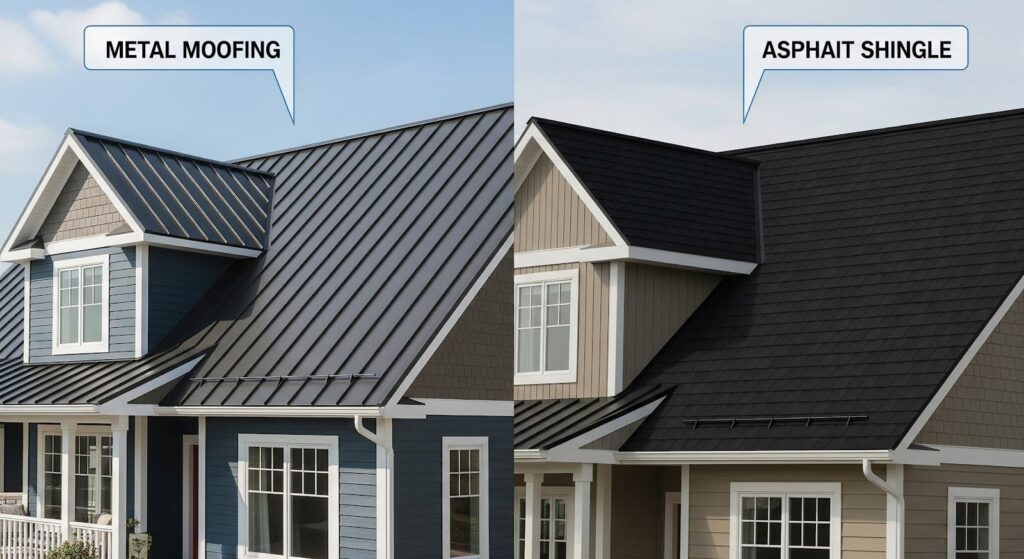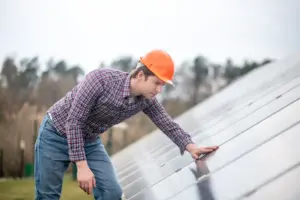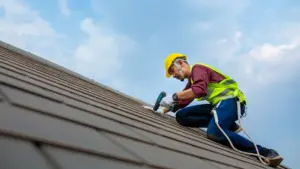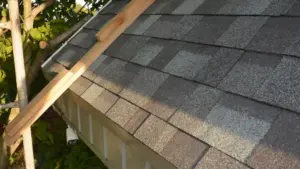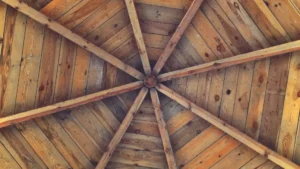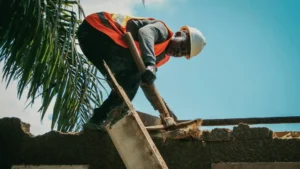Stop. Before you sign that roofing contract, I need to tell you about the phone call that changed everything.
It was 2 AM when Sarah called me, crying. Her “30-year” shingle roof had failed after just 14 years. The leak destroyed her hardwood floors, ruined family photos, and left her facing a $50,000 repair bill that insurance wouldn’t fully cover.
Meanwhile, her neighbor Jim – who installed a metal roof the same year – was sleeping peacefully while the same storm that destroyed Sarah’s house barely registered on his roof.
Here’s the brutal truth most contractors won’t tell you: your roofing decision will either save you thousands or cost you everything.
So let’s dive into the benefits of metal roof vs shingles and settle this debate once and for all. I’ll show you exactly why understanding how long composite roofs last versus metal could save (or cost) you a fortune.
The Longevity Game: How Long Does Your Roof Really Last?
Here’s where things get interesting, and where most homeowners get completely bamboozled by smooth-talking sales reps.
Composition Shingles: The Reality Check
When someone asks me “how long does a composite roof last” or “how long do composite roofs last”, I always give them the brutal truth their contractor won’t.
The composition shingle roof life reality:
| Shingle Type | Expected Life | Real-World Life |
| Basic 3-tab | 15-20 years | 15-18 years |
| Architectural | 20-30 years | 18-25 years |
| Premium composite | 30-40 years | 25-35 years |
But here’s the kicker – that’s assuming perfect conditions. No hail. No hurricanes. No ice dams. In the real world? I’ve seen “30-year shingles” start curling at year 12.
Metal Roofing: The Overachiever
Metal roofs? They’re like that friend who looks better at 50 than they did at 30. Check this out:
| Metal Type | Lifespan | Maintenance |
| Steel | 40-70 years | Minimal |
| Aluminum | 50-75 years | Almost none |
| Copper/Zinc | 100+ years | Zero |
I’ve inspected metal roofs from the 1970s that still look brand new. Try finding a composition shingle roof from that era that doesn’t look apocalyptic.
The Benefits Breakdown: Metal Roof vs Shingles Head-to-Head
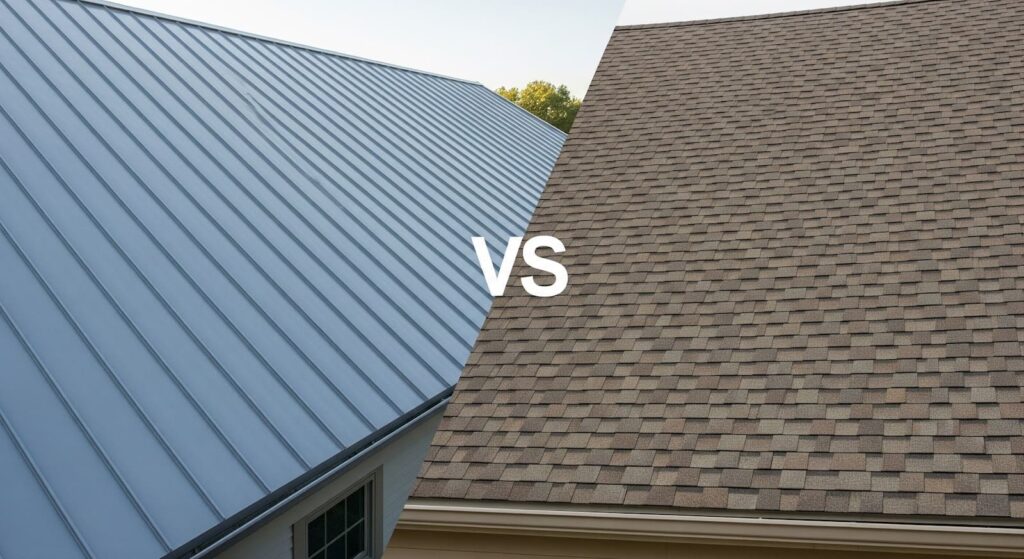
| Factor | Metal Roofing | Shingle Roofing |
| Lifespan | 40-70+ years | 15-30 years |
| Wind Resistance | Up to 140 mph | 60-70 mph |
| Energy Savings | Up to 40% | Minimal |
| Fire Rating | Class A | Varies |
| Maintenance | Minimal | Regular |
| Weather Damage | Extremely rare | Common |
| Insurance Discounts | Often available | Rarely |
Energy Efficiency: Your AC Will Thank You
This is where understanding the real benefits of metal roof vs shingles gets interesting. Metal roofs can save homeowners around 40% on energy costs, while asphalt shingles absorb heat and can cut energy costs by about 50% less than metal.
Shingles? They’re solar ovens. They absorb heat like crazy. Your attic becomes Death Valley. Your AC works overtime.
One customer saw summer bills drop $45 monthly after switching to metal. That’s $540 yearly. Over 30 years? That’s $16,200 in savings.
Weather Resistance: The Storm Survivor
Here’s something that’ll make you lose sleep: metal roofs can withstand winds up to 140 mph, while most composition shingles start peeling off at 60-70 mph.
I’ve walked through neighborhoods after Category 3 hurricanes where metal roofs looked pristine while shingle roofs looked like confetti factories exploded. The Federal Emergency Management Agency actually recommends metal roofing for high-wind zones because they know what survives disasters.
Fire Resistance: The Safety Factor
Metal roofs have a Class A fire rating – the highest possible. Composition shingles? Well, let’s just say they’re made from petroleum products and leave it at that.
I’ve seen houses with metal roofs survive wildfires that destroyed everything around them. When your neighbors are dealing with insurance claims, you’re just hosing off the ash.
The Real Talk: Why Most People Still Choose Shingles
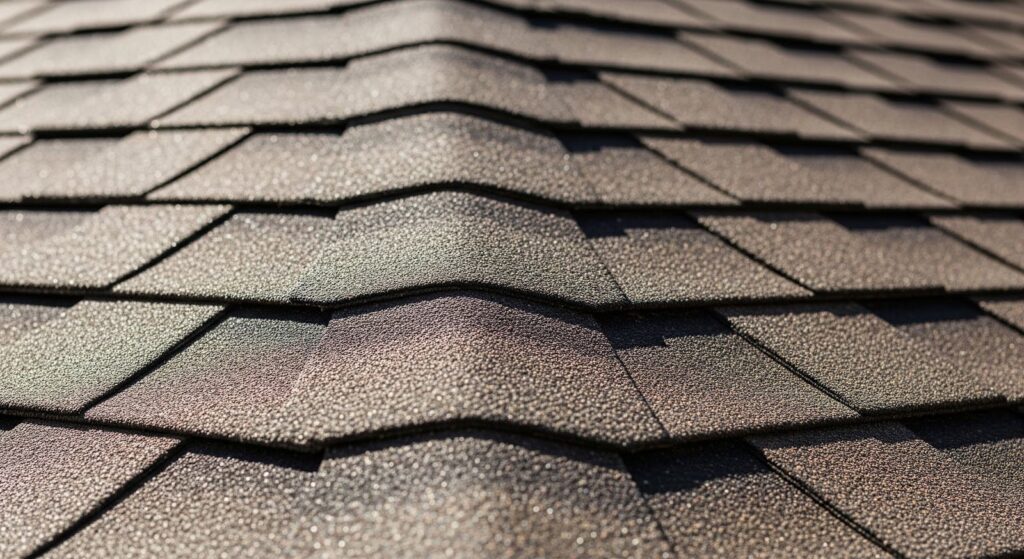
Let’s be honest – if metal roofs are so amazing, why isn’t everyone using them? Three reasons:
1. Upfront Cost Reality Check
Metal roofing typically costs 2-3 times more than composition shingles initially. But here’s the math your contractor won’t do for you: if you’re planning to stay in your house more than 15 years, metal often comes out cheaper in the long run.
2. The Noise Myth
“But won’t it sound like I’m living inside a drum during rainstorms?” This is the #1 concern I hear, and it’s based on outdated information. Modern metal roofs with proper insulation and solid decking are actually quieter than many shingle roofs.
3. Aesthetic Preferences
Some people just love that traditional shingle look. Fair enough – beauty is in the eye of the beholder. But modern metal roofing comes in styles that mimic slate, wood shake, and even traditional shingles.
When Metal Makes Sense vs When Shingles Work
Choose Metal Roofing If:
- Staying 15+ years
- Want energy savings
- Live in severe weather zones
- Tired of roof repairs
- Want maximum home value
Choose Shingle Roofing If:
- Tight budget now
- Moving within 10 years
- Prefer traditional looks
- Mild climate area
- Want lower upfront costs
The real question isn’t “how long does a composite roof last” – it’s whether you want to replace your roof twice in your lifetime or install it once and forget about it.
For a deeper dive into all your roofing material options, check out our ultimate guide to residential roofing materials – it covers everything from clay tiles to synthetic options you probably haven’t considered.
Bottom Line: The Math That Matters
When my sister asked what to put on her house, I showed her this simple math:
Shingle Route (30 years):
- Initial cost: $15,000
- Second roof: $18,000 (inflation)
- Repairs/maintenance: $3,000
- Energy waste: $8,000
- Total: $44,000
Metal Route (30 years):
- Initial cost: $28,000
- Repairs: $500
- Energy savings: -$6,000
- Total: $22,500
Metal saves over $20,000 long-term. That’s not including insurance discounts or increased home value.
Understanding how long composite roofs last versus metal isn’t just about durability. It’s about your financial future.
Whatever you choose, just promise me you’ll get multiple quotes, check references, and ask the hard questions. Your roof is literally what stands between your family and the elements – it deserves better than a quick decision based on the lowest bid.
Frequently Asked Questions
What are the main benefits of metal roof vs shingles?
Metal roofs last 40-70+ years vs 15-30 for shingles, reduce cooling costs by 10-15%, withstand 140 mph winds (vs 60-70 mph), and require minimal maintenance. Higher upfront cost but better long-term value.
How long does a composite roof last compared to metal?
Composite shingles: 15-30 years typically. Metal roofs: 40-70+ years minimum. Metal outlasts shingles 2-3 times over, making it more cost-effective long-term despite higher initial investment.
How long do composite roofs last in severe weather conditions?
Severe weather reduces composite roof life to 12-20 years in most cases. Hail, high winds, and temperature swings accelerate deterioration. Metal roofs maintain full lifespan regardless of weather conditions.
Are metal roofs worth the higher upfront cost?
Yes, if staying 15+ years. Energy savings, longevity, and insurance discounts offset the 2-3x higher initial cost. Total ownership cost is often lower than replacing shingles multiple times.
Do metal roofs make more noise than shingle roofs?
No. Modern metal roofs with proper insulation are actually quieter than most shingle roofs. The “noisy” reputation comes from old barn-style installations without proper underlayment.
What’s the best roofing choice for hurricane-prone areas?
Metal roofing. Wind resistance up to 140 mph vs 60-70 mph for shingles, plus better impact resistance and water sealing. FEMA recommends metal for high-wind zones.
How do metal roofs and shingles compare for home resale value?
Metal roofs provide 85-95% cost recovery vs 65-85% for shingle replacement. Buyers view metal as a premium upgrade that eliminates future roofing concerns for decades.

